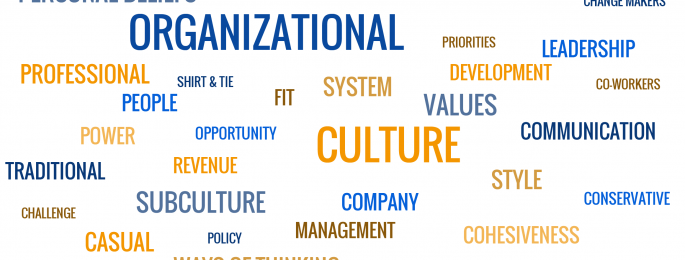Company Culture: What to Consider During Your Job Search
by Ed Weirauch, Lead Resume Writer
Understanding the culture of a company or workplace can be key to your success and longevity with that company. How might a corporate culture be determined when you are on a job search, just getting to know a company or deciding on a job offer? Being alert of the potential impact of a company’s culture is half the battle.
A corporate culture can be loosely defined as ‘the way things get done’ in a corporation, what works and what doesn’t, sometimes unstated traditions and approaches; although with some employers, a culture may be clearly defined.
What to Look For
A basic way to identify a workplace’s culture can often be as simple as noticing the dress code. If men are still in ties, that culture is probably fairly conservative. In professional settings like law firms, investment banking and finance, people are likely to be dressed conservatively because they need to earn their clients’ trust and confidence. Often this carries over into conservative approaches to new ideas and a hesitation to easily accept a new person’s ideas.
On the other hand, seemingly no dress code at all can indicate an acceptance of new ideas, perhaps even an expectation that you bring a new approach. I suspect that the computer programming and marketing industries could be credited with the rise of khakis and open shirts in the workplace and the demise of the suit and tie because the very livelihood of these industries depends on change, sometimes even revolutionary in nature.
So becoming aware of culture signs is important and knowing where and how you fit can determine your success. If you have been in a ‘shirt and tie’ industry and are moving into a khaki job world, you must understand that this difference goes beyond the wardrobe. You may have developed conservative approaches to your business and now you’re working in a world where you’re expected to offer new ideas and approaches. So shopping for casual clothes may not be enough; be ready to adjust your approach to the work itself.
Other indications of culture can be the work environment. Do most people work in offices, cubicles or in an open environment? Offices can indicate individual approaches while open environments can be more conducive to teamwork, idea sharing and group development. Which works for you?
Cultures of for-profit and non-profit are often thought to be different and if you’re moving from one to the other, be aware of this. Is your new organization on a mission to help people or to generate revenue and satisfy its shareholders. Neither has to be right or wrong, good or bad but if you’re going to succeed in either of these, you need to understand which is paramount.
Addressing the Culture Question
Perhaps your prospective employer is so conscious of the importance of culture that the people you meet talk about it openly during your interviews. This makes it easy for you and also indicates that this group is serious about their culture. More typical is the workplace where you may need to dig a little to detect the culture. Consider these questions:
- Just ask up front: “How would you describe your corporate culture?” If the person hesitates or gives an unclear answer, that’s a sign that culture and values aren’t a priority or that the culture might be challenging.
- “What might be some less obvious factors I should think about in my success and ability to contribute here?” This is a good question after you have discussed the actual work and expectations of the prospective employer. You may need to clarify this question by asking “how does work actually get done?”
- “How would you describe the people here, generally?” You want to keep this exchange conversational and friendly while privately considering the answers you get to be very important.
A good way to evaluate the prospective employer’s culture is to see if you can meet the team, rather than just the manager, director or vice-president. You’re going to be working with these people so why not spend a few minutes with them. A good question for your prospective co-workers: “So what’s it like to work here” or “how do you like working here?”
Asking these questions can be the easy part of a job search. Evaluating the answers and thinking long and hard about how you fit into that culture, whether it’s described or you have to detect it, is your real test!
One Page or Two? The Resumé Question
by Barton Career Advisors Coach Michael Quinn and Lead Resumé Writer Ed Weirauch
Over the last few years, the belief that resumés should be limited to one page has taken on a life of its own. Many job seekers believe this theory and are going crazy trying to get their life’s work squeezed onto one page. There are lots of aspects to consider on this issue but our advice is to focus on content rather than length.
First, we shouldn’t think of a hiring manager receiving a traditional paper resumé because it rarely happens this way. The common practice is for resumes to go through an online sorting and scoring process in search of keywords and phrases that match candidates with job opportunities. So what matters is the content and the keywords you use to describe your skills and accomplishments.
In fact, these keywords are so important that they should be highlighted on the top half of your resumé, where the computer and eventually a person will see them first. Similarly, a lead paragraph should contain an effective summary of your work using these keywords. When the computer catches these words and phrases which match the job skills being sought, your resumé then moves to the hiring manager.
For these reasons, that top half of your resumé must be captivating and must tell hiring managers that you are an obvious choice for the position, that hiring you will satisfy their need, make them look great, contribute to a company’s bottom line and therefore you should be contacted immediately.
Take the belief that your resumé can only be one page out of your mind and replace it with the belief that the top half of my resumé mustsummarize me, match the skills being sought and captivate the hiring manager’s attention. Maybe that’s not as easy to remember as the a one-page resumé concept but it is a much more on-target strategy for you.
Second, focus on accomplishments and do it succinctly. An employer wants to know how you have contributed in your career, the difference you have made, initiatives you have taken, changes you have led, savings you have achieved and profits to which you have contributed. And if you can quantify these, even better.
But don’t forget the ‘succinct’ part. Imagine you suddenly must convey this information in two minutes… clear out all the details and get to the point! Allow yourself to shine. This information will serve you far better than a more traditional listing of tasks for which you were responsible.
Instead of focusing on length, think in terms of content. Ask yourself “how can I make my resume most appealing to hiring managers?” Be thinking of them and their needs, that’s where your opportunity lies.
Along these lines is a third concept: eliminate the activities, interests and hobbies section. These were once very common parts of resumes as employers were looking to get a sense of the entire person. With hundreds of candidates for jobs and computers doing the sifting and sorting, hobbies have become unnecessary clutter. Those aspects can be brought out in face to face interviews. What you accomplished so far in your career is far more important.
An exception here is when you can cite volunteer work where you really made a difference or had an impact on an organization or group of people. Include your volunteerism and if possible, make reference to any impact you may have had. This can be especially effective for job seekers who have been out of the job market for a while.
Finally, here are some general guidelines for you to keep in mind regarding resumé length:
One-page resumes generally work for people with:
1. Limited work history and experience; recent graduates
2. Less than three employers; less than five years experience
While two-page resumes work for people with:
1. More than five years work history and/or three or more employers
2. Significant professional and highly technical accomplishments
3. Significant volunteer or community involvement
So here’s our resumé message, to replace “it has to be one page”: make your resume accomplishment-oriented yet succinct so hiring managers know what you can do for them.
Angry Elmer Fudd
Originally published 2009

All of us remember that beloved character from the Looney Tunes™, Elmer Fudd. He was hilarious because he worked really hard at tracking that rascally rabbit. However, he never quite seemed to end up with his prize in a big stock pot on top of the stove. Didn’t someone famous say, “A bird in the hand is better than two in the bush”? Anyway, I digress. Elmer is much like some of the job seeker types that we see in the marketplace. The Elmer Fudd job seeker gets to the final stage of the interview process but never gets the position. Much like the animated rabbit hunter that we all know and love this person in career transition never lands their ultimate prize- a new and interesting career.
More entertaining and perhaps even more tragic is when Elmer Job Seeker goes “postal” on the people that have been working with them throughout the process, particularly the recruiter that delivers the turndown decision. I work with a great team of partners and professionals every day and have the opportunity to sit around some great recruiters. Recently I heard a conversation that blew my mind. A senior level professional recruiter was delivering a turndown decision over the phone to a candidate in the final stages of a retained search. This particular candidate had actually interviewed with the client and was indeed a pretty good candidate for the role…but not quite the fit that was needed. I heard the recruiter’s tone of voice start to get sharper and more pointed, “I am just trying to deliver some useful feedback that you can use…..[silence]. I understand that you are disappointed [silence]. No, I would not advise that [silence]. Well, best wishes to you and I am sorry you feel that way.”
I have listened to this particular recruiter verbally communicate turndown decisions at least a dozen times in a caring, thorough and professional way. He takes the time to add value to all the professionals with whom he interacts, even the ones he has to turndown. What happened? I knew right away. Elmer got angry and unloaded an arsenal of vitriolic commentary in the frustration over not getting the nod for the position. When Elmer was finished not only had he razed the relationship “bridge” between him and the recruiter, he had firebombed the whole network “village” connected to this valuable career advocate.
It’s taught in the “Relationships 101” class that you don’t tear apart the people that have to deliver disappointing news. If you are lucky enough to come across a talented, principled recruitment professional who acts as your advocate, nurture that relationship and embrace every ounce of feedback you get. Better to leave the turndown with something in your back pocket- a powerful networking contact to aid your career transition objectives. After hearing this conversation I walked down the hall to my recruitment friend’s desk and said, “I bet you’ll have that guy at the top of your list on your next search.” My friend just looked at me and smiled. I said, “Elmer got angry, huh?” We shared a good belly laugh.




